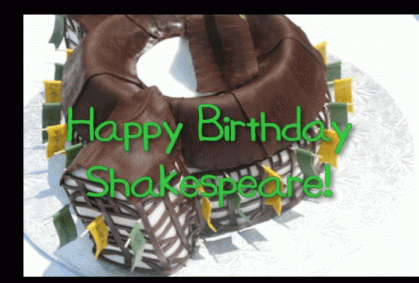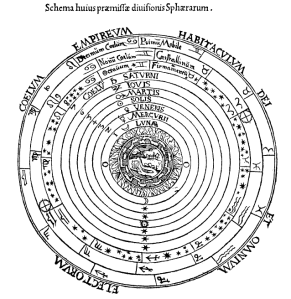Blog Archives
Happy Birthday, Shakespeare
 Today, I’d like to switch hats for a little while from Astro-nut to Shakespeare Geek. I’ve been studying Shakespeare for a long time and since today is his birthday, I thought I’d take some time to celebrate it. Like a lot of Elizabethans, Shakespeare believed that the stars and planets helped to influence a person’s destiny. Of course, he lived in the time of Galeleo and Copernicus who questioned these established opinions, and you can hear this changing tide of ideology in the dialogue of his plays. Plus, Shakespeare frequenly uses stellar images to add some extra spice to his love poetry. After all, who doesn’t want to be compared to the radient Venus, the brilliant stars, or the kingly Jupiter?
Today, I’d like to switch hats for a little while from Astro-nut to Shakespeare Geek. I’ve been studying Shakespeare for a long time and since today is his birthday, I thought I’d take some time to celebrate it. Like a lot of Elizabethans, Shakespeare believed that the stars and planets helped to influence a person’s destiny. Of course, he lived in the time of Galeleo and Copernicus who questioned these established opinions, and you can hear this changing tide of ideology in the dialogue of his plays. Plus, Shakespeare frequenly uses stellar images to add some extra spice to his love poetry. After all, who doesn’t want to be compared to the radient Venus, the brilliant stars, or the kingly Jupiter?
So today, I’d like to sojurn with you for a while away from the shores of science, and into the sweet waters of music and poetry related to the stars, with Shakespeare as the pilot for our vessel. Hope you enjoy it!
The Facts Are These:
- Shakespeare lived from 1564 to 1613, and died at the age of 52.
- He wrote 37 surviving plays, 154 sonnets, and four epic poems.
- The word “Stars” appears 77 times in Shakespeare’s work.
- The god Jupiter appears as a character in one of his final plays, “Cymbeline”
- In his tragedy “King Lear” an old lord worries about disasters called by eclipses and comets.
- One of Shakespeare’s greatest characters, Prospero, is a magician who uses the powers of astrology to control the elements.
- Shakespeare was called “Sweet Swan Of Avon” by his contemporary Ben Johnson. The river Avon flowed through his home town of Stratford in Warrickshire. You can still see the swans today!
Some Famous Quotes From Shakespeare About Stars:
Doubt thou the stars are fire;
Doubt that the sun doth move;
Doubt truth to be a liar;
But never doubt I love. – Hamlet
Take him and cut him into little stars,
And he will make the face of heaven so fine
That all the world will be in love with night
And pay no worship to the garish sun -Romeo and Juliet
The fault, dear Brutus, is not in our stars, but in ourselves – Julius Caesar
FOOL: The reason the seven stars are only seven is a pretty reason,
KING LEAR: Because they are not eight?
FOOL: Yes, indeed: thou wouldst make a good fool.
Shakespeare and Astrology

A diagram from the 17th century of the different planetary spheres and their influence on the four elements.
As I’ve mentioned in the “This Month In Astrology” posts, people of Shakespeare’s day believed that the planets and stars could influence a person’s desitny and their character. They believed that the universe contained four basic elements called humours, that were the forces behind the planets, the stars, and our bodies. The four humours corresponded to the four basic elements- Earth, Air, Water, and Fire. These humours reflected aspects of people’s personality- the cold and dry meloncholy, the warm and airy blood, the hot and fiery cholor, and the slow and temperate phlegm (the humour of water). Living in ballence with the planets, stars, and your own bodily humours was the best way to live a healthy life, so Shakespeare and his contemporaries studied the stars to figure out how to control and understand their lives. Queen Elizabeth herself had a pesronal astrologer who helped her get through the invasion of the Spanish Armada. A lot of Shakespeare’s tragedies focus on people whose destinies seem to be influenced by bad stars or planets. As I mentioned in “The Ides Of March” post, a bad planet or a comet could influence the fates of powerful people. Meanwhile, the comedies focus on people who let their humours take over them; from the melancholic Jaques to the foolish constable Dogberry, to the brave but idiotic Orlando, Shakespeare’s characters are at their funniest, when they are at their most “humourous.” In short, Shakespeare’s understanding of the humours and the stars allowed him to classify and examine different types of people, and how they deal with extrodinary situations. This is one reason we continue to read his work 400 years later.Finally, a little poetry reading. Here is one of Shakespeare’s sonnets, a short poem that’s only 14 lines long.
In this poem, the speaker rejects the doctrine of Astrology when looking into the face of his beloved, and instead claime that the only celestial light he needs is in the bleoved’s eyes. When those lights are gone, the universe as he knows it will end, so he advises the object of his affection to have children to allow those lights to renew. This is the format of the first 126 sonnets, but Shakespeare uses incredibly varied devices to make the same simple point.
So I hope this little sojourn into Shakespeare’s swan boat was entertaining for you and I hope combining my love of astronomy and Shakespeare will help you, the reader to appreaciate both even more.
Happy Stargazing,
Paul
“Jove and my stars be praised! Here is yet a postscript” – Twelfth Night
PS. If you liked this little exploration into stellar poetry, please leave a comment below. There is a rich vein of poetry related to the Sun, Moon, and stars, and I would love to write about them in future posts.

